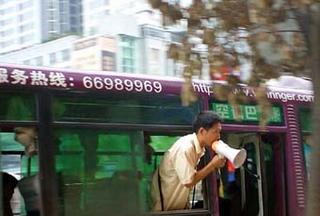Buses

Buses are an essential part of China's travel network and as the cheapest form of public transport they are usually busy and hence filled with many conversations in the local dialect. Like the taxis they are numerous and also old and their diesel engines can be heard struggling to climb the hills in the slow moving traffic. Unlike the taxis, they lack air conditioning, and so all the windows are open and one travels with the noise of the other traffic.
With a squeal of the brakes the bus stops at each designated place followed by the sharp hiss of the hydraulic doors. At this point the driver shouts the name of the location, unless there is a bus conductor in which case then s/he takes this role. If there’s a crowd at the bus stop the conductor will also shout out the window or the open door to inform them of the journey’s destination. Usually this is done by voice alone, though I have seen some conductors also use megaphones. With another hiss of the doors, punctuated by a closing ‘thunk’, the engine noise increases and the next part of the journey begins.
With all this activity, one could be forgiven for thinking that no more sounds were needed; however, this is not the case with the newer buses, which boast a television or two blaring out a harsh unrelated environment and adding confusion to what was an already packed, yet coherent sonic picture.

<< Home